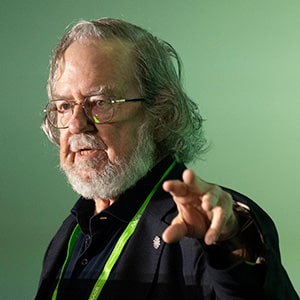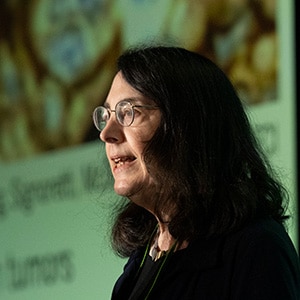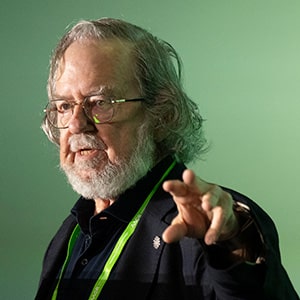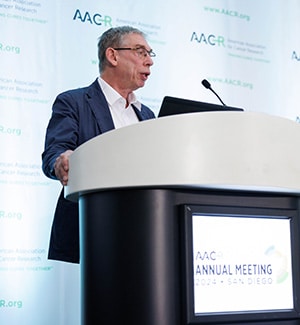“The story of effective cancer immunotherapies starts with the understanding of the function of CTLA-4, which was elucidated 30 years ago by the groups of James Allison and Arlene Sharpe,” declared Antoni Ribas, MD, PhD, FAACR, scientific committee chair of the inaugural AACR IO conference and AACR Past President 2020-21, as he introduced the opening keynote session celebrating the history of immune checkpoints.
The meeting, whose theme is “Discovery and Innovation in Cancer Immunology: Revolutionizing Treatment through Immunotherapy,” is being held February 23-26, 2025 in Los Angeles.
It’s been three decades since seminal discoveries lit the fuse of cancer immunotherapy, transforming oncology and cementing immunotherapy’s place in cancer care. The revelation of the powerful roles played by immune checkpoints sparked a paradigm shift. No longer were doctors limited to targeting tumors directly. Now, they could help patients by enabling their immune system to do what it does best: protect us from threats.
Igniting Cancer Immunotherapy

In the first step on his path to the 2018 Nobel Prize in Physiology or Medicine, James P. Allison, PhD, FAACR, now the Regental Professor and chair of the Department of Immunology and director of the James P. Allison Institute at The University of Texas MD Anderson Cancer Center, demonstrated that antibodies against CTLA-4 could eliminate tumors in mice—proof that the immune system could be reprogrammed to fight cancer. The same year, Arlene H. Sharpe, MD, PhD, FAACR, now the Kolokotrones University Professor at Harvard University and chair of the Department of Immunology at Harvard Medical School, created mice that lacked CTLA-4, which revealed that CTLA-4 acts as a brake on T cells and confirmed its role as an immune checkpoint of consequence.
Sharpe and Allison were just getting started, but few in 1995 could have foreseen where their work would lead. Or the impact it would make in patients’ lives.
In particular, Allison told the story of his relationship with Sharon Belvin, whom he first met after his anti-CTLA-4 therapy cured her seemingly incurable metastatic melanoma. “Doctors couldn’t find any tumors in any of her scans, anywhere, and at first they thought they’d mixed them up,” Allison recounted.
“I got to know her pretty well, to the point that she asked me to officiate her marriage years later. She also came with us to Stockholm for the Nobel Prize,” Allison beamed. “More importantly, she’s still doing fine today, 20 years out, with no subsequent retreatment.”
During their keynote lectures, Allison and Sharpe shared the trailblazing journey of developing checkpoint immunotherapy. They reflected on how a once-radical idea evolved into a pillar of cancer care. From the initial discoveries to the widespread clinical success of checkpoint inhibitors, they highlighted the scientific milestones that expanded immunotherapy’s reach across multiple cancer types and hinted at how we might foster the next generation of breakthroughs.
Their pioneering work on CTLA-4, which led to the FDA approval of ipilimumab (Yervoy) in 2011, also opened the door for the next immune checkpoint target: PD-1. In 2014, the first PD-1 checkpoint inhibitors received FDA approval, and they now form the backbone of modern cancer immunotherapy.
Recent Advances and New Frontiers
Turning back to the present, Allison shared insights from recent studies exploring the complexities of the tumor microenvironment, including defining a feedback loop between T cells and macrophages within tumors. He also highlighted long-term clinical data demonstrating the durability of dual checkpoint blockade responses, finding that nearly half of metastatic melanoma patients treated with ipilimumab plus nivolumab (Opdivo) survived at least six years. Impressively, 96% of the patients who were recurrence-free at the three-year mark lived at least 10 years after treatment.
Despite immunotherapy’s successes, Allison emphasized the need for a broader approach in identifying new immune checkpoints to target therapeutically, urging the field to rethink drug development strategies that overemphasize single-agent activity.

In search of new cures, Sharpe has delved into the microbiome and its ability to shape patient responses to immunotherapy. While it’s long been understood that gut bacteria influence treatment outcomes, Sharpe sought to learn more about how this happens. “I hoped that we could get a better mechanistic understanding of how so called ‘good’ bacteria work to enhance cancer immunotherapy, and hopefully, as a result, identify new cancer immunotherapy targets,” she said.
To that end, her team found that the interaction between the immune checkpoint protein PD-L2 and its binding partner RGMb impacts immunotherapy responses mediated by the microbiome. Blocking this pathway enhanced antitumor immune responses in mice, even in cancers that are typically resistant to PD-1 inhibitors, highlighting this strategy’s potential to improve outcomes in patients unresponsive to this class of drugs.
Sharpe also employed the gene-editing technology CRISPR in her search for new immune checkpoints to screen for proteins of interest by systematically deleting genes in T cells and observing the effects. Through this approach, she identified STUB1 as a target that suppresses antitumor immunity via IL-27Rα signaling. Buoyed by her preclinical work, Sharpe continues to explore this promising avenue.
Optimism and the Road Ahead
In the early 1990s, the notion of using the immune system to fight cancer was considered by many to be a fool’s errand. Today, thanks to the pioneering work of Allison and Sharpe, among others, immune checkpoint inhibitors are improving outcomes for many cancer patients. Equally important, they helped build a foundation upon which future progress can be accelerated and new approaches can be developed for those that desperately need them.
As Allison concluded, “We’re getting there, but we know we can do better.”
The post Inaugural AACR IO Conference Kicks Off With Celebration of Immune Checkpoints appeared first on American Association for Cancer Research (AACR).



